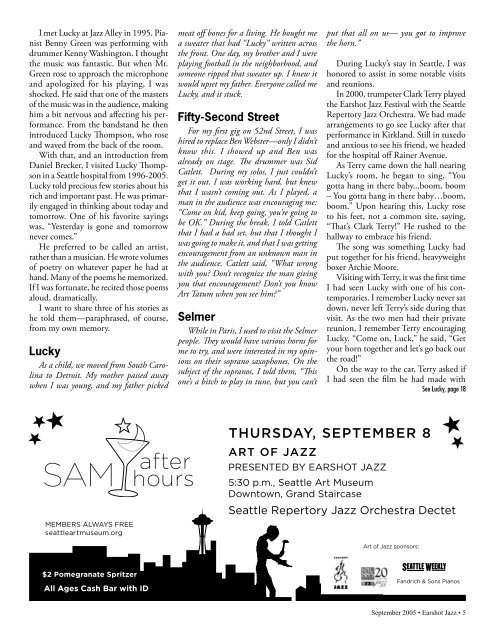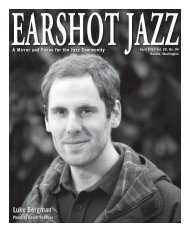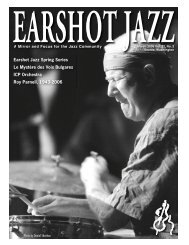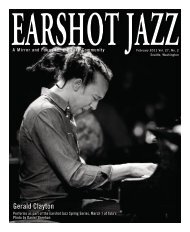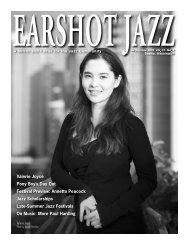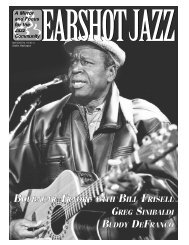Isabella Du Graf, P 12 Lucky Thompson ... - Earshot Jazz
Isabella Du Graf, P 12 Lucky Thompson ... - Earshot Jazz
Isabella Du Graf, P 12 Lucky Thompson ... - Earshot Jazz
Create successful ePaper yourself
Turn your PDF publications into a flip-book with our unique Google optimized e-Paper software.
I met <strong>Lucky</strong> at <strong>Jazz</strong> Alley in 1995. Pianist<br />
Benny Green was performing with<br />
drummer Kenny Washington. I thought<br />
the music was fantastic. But when Mr.<br />
Green rose to approach the microphone<br />
and apologized for his playing, I was<br />
shocked. He said that one of the masters<br />
of the music was in the audience, making<br />
him a bit nervous and aff ecting his performance.<br />
From the bandstand he then<br />
introduced <strong>Lucky</strong> Th ompson, who rose<br />
and waved from the back of the room.<br />
With that, and an introduction from<br />
Daniel Brecker, I visited <strong>Lucky</strong> Th ompson<br />
in a Seattle hospital from 1996-2005.<br />
<strong>Lucky</strong> told precious few stories about his<br />
rich and important past. He was primarily<br />
engaged in thinking about today and<br />
tomorrow. One of his favorite sayings<br />
was, “Yesterday is gone and tomorrow<br />
never comes.”<br />
He preferred to be called an artist,<br />
rather than a musician. He wrote volumes<br />
of poetry on whatever paper he had at<br />
hand. Many of the poems he memorized.<br />
If I was fortunate, he recited those poems<br />
aloud, dramatically.<br />
I want to share three of his stories as<br />
he told them—paraphrased, of course,<br />
from my own memory.<br />
<strong>Lucky</strong><br />
As a child, we moved from South Carolina<br />
to Detroit. My mother passed away<br />
when I was young, and my father picked<br />
�������������������<br />
��������������������<br />
�����������������������<br />
�������������������������<br />
meat off bones for a living. He bought me<br />
a sweater that had “<strong>Lucky</strong>” written across<br />
the front. One day, my brother and I were<br />
playing football in the neighborhood, and<br />
someone ripped that sweater up. I knew it<br />
would upset my father. Everyone called me<br />
<strong>Lucky</strong>, and it stuck.<br />
Fifty-Second Street<br />
For my fi rst gig on 52nd Street, I was<br />
hired to replace Ben Webster—only I didn’t<br />
know this. I showed up and Ben was<br />
already on stage. Th e drummer was Sid<br />
Catlett. <strong>Du</strong>ring my solos, I just couldn’t<br />
get it out. I was working hard, but knew<br />
that I wasn’t coming out. As I played, a<br />
man in the audience was encouraging me:<br />
“Come on kid, keep going, you’re going to<br />
be OK.” <strong>Du</strong>ring the break, I told Catlett<br />
that I had a bad set, but that I thought I<br />
was going to make it, and that I was getting<br />
encouragement from an unknown man in<br />
the audience. Catlett said, “What wrong<br />
with you? Don’t recognize the man giving<br />
you that encouragement? Don’t you know<br />
Art Tatum when you see him?”<br />
Selmer<br />
While in Paris, I used to visit the Selmer<br />
people. Th ey would have various horns for<br />
me to try, and were interested in my opinions<br />
on their soprano saxophones. On the<br />
subject of the sopranos, I told them, “Th is<br />
one’s a bitch to play in tune, but you can’t<br />
put that all on us— you got to improve<br />
the horn.”<br />
<strong>Du</strong>ring <strong>Lucky</strong>’s stay in Seattle, I was<br />
honored to assist in some notable visits<br />
and reunions.<br />
In 2000, trumpeter Clark Terry played<br />
the <strong>Earshot</strong> <strong>Jazz</strong> Festival with the Seattle<br />
Repertory <strong>Jazz</strong> Orchestra. We had made<br />
arrangements to go see <strong>Lucky</strong> after that<br />
performance in Kirkland. Still in tuxedo<br />
and anxious to see his friend, we headed<br />
for the hospital off Rainer Avenue.<br />
As Terry came down the hall nearing<br />
<strong>Lucky</strong>’s room, he began to sing, “You<br />
gotta hang in there baby...boom, boom<br />
– You gotta hang in there baby…boom,<br />
boom.” Upon hearing this, <strong>Lucky</strong> rose<br />
to his feet, not a common site, saying,<br />
“Th at’s Clark Terry!” He rushed to the<br />
hallway to embrace his friend.<br />
Th e song was something <strong>Lucky</strong> had<br />
put together for his friend, heavyweight<br />
boxer Archie Moore.<br />
Visiting with Terry, it was the fi rst time<br />
I had seen <strong>Lucky</strong> with one of his contemporaries.<br />
I remember <strong>Lucky</strong> never sat<br />
down, never left Terry’s side during that<br />
visit. As the two men had their private<br />
reunion, I remember Terry encouraging<br />
<strong>Lucky</strong>. “Come on, Luck,” he said, “Get<br />
your horn together and let’s go back out<br />
the road!”<br />
On the way to the car, Terry asked if<br />
I had seen the fi lm he had made with<br />
See <strong>Lucky</strong>, page 18<br />
���������������������<br />
�����������<br />
�������������������������<br />
�����������������������������<br />
��������������������������<br />
���������������������������������������<br />
����������������������<br />
����������������������<br />
September 2005 • <strong>Earshot</strong> <strong>Jazz</strong> • 5


